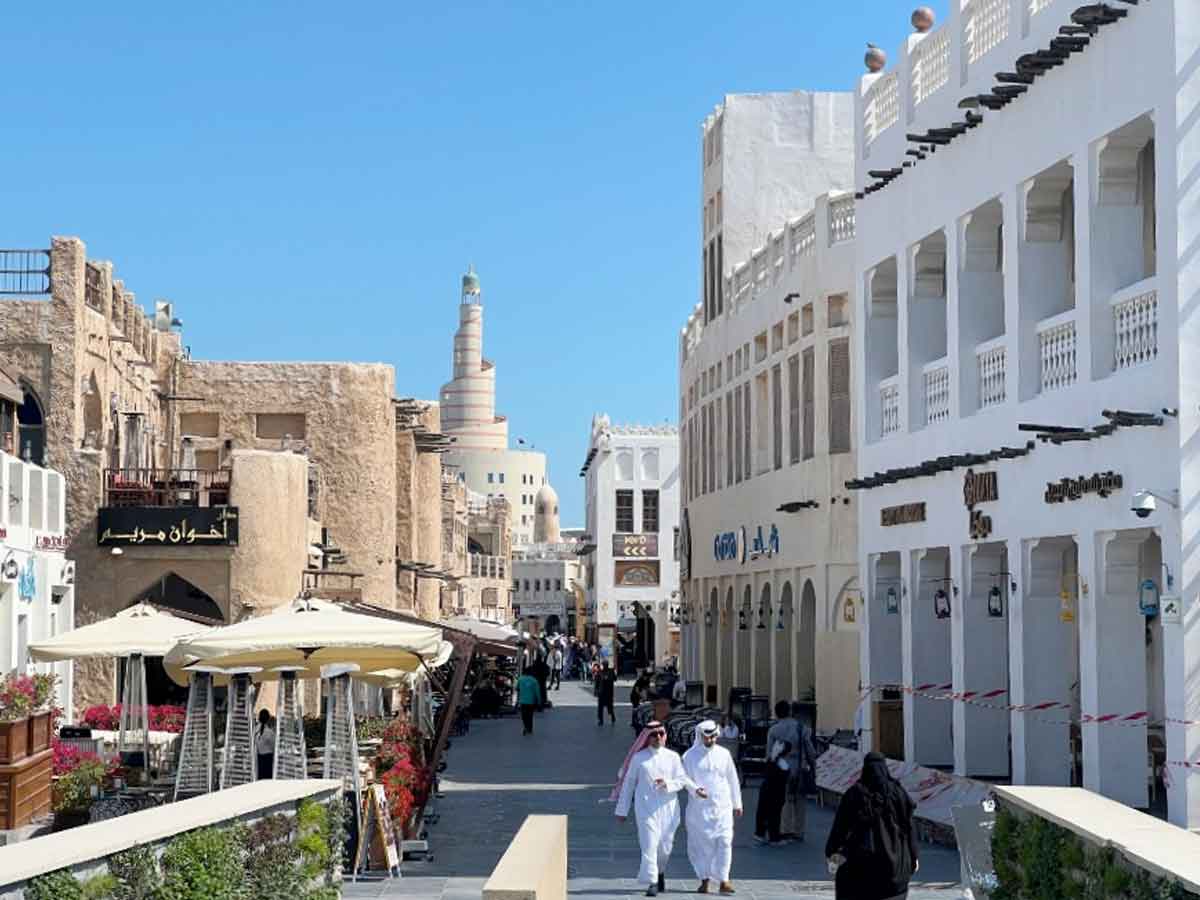الثقافة القطرية هو نسيج غني من التقاليد, الحداثة, والقيم العميقة الجذور, تأثرت بجغرافيتها, تاريخ, والدين. تقع على الساحل الشمالي الشرقي لشبه شبه الجزيرة العربية, قطر دولة صغيرة ذات هوية ثقافية مهمة تعكس جذورها البدوي, المعتقدات الإسلامية, والتحديث السريع بسبب ثروته النفطية والغاز. إن فهم الثقافة القطرية يعني الخوض في معاييرها الاجتماعية, هياكل الأسرة, ضيافة, التقاليد, والتأثير الدائم للإسلام على الحياة اليومية.
السياق التاريخي للثقافة القطرية
ترتبط ثقافة قطر بعمق بـ الماضي الماضي, عندما عاش السكان الأصليون في المنطقة أنماط الحياة البدوية, اجتياز الصحارى القاسية. أكدت تقاليد البدو الضيافة, الحيلة, واحترام الانتماءات القبلية. هذا الماضي, على الرغم من بعيد, لا تزال تشكل روح المجتمع القطري اليوم, لا سيما من حيث التفاعلات الاجتماعية والسندات المجتمعية.
قبل اكتشاف الزيت في القرن العشرين, يدور اقتصاد قطر حول الغوص اللؤلؤ, الصيد, والتجارة على نطاق صغير. عززت عزل المنطقة واعتمادها على البحر مجتمعًا متماسكًا عن قرب. جلب اكتشاف الزيت في منتصف القرن العشرين تغييرًا سريعًا, تحويل قطر إلى واحدة من أغنى الدول في العالم وتحفيز التحديث. رغم هذا, يحافظ القطريون على صلات قوية بتراثهم الثقافي, ضمان أن التقليد لا يزال منسوجًا في نسيج الحياة اليومية.
الدين ودوره في الثقافة القطرية
في قلب الثقافة القطرية يكذب الإسلام, الذي لا يشكل فقط الممارسات الدينية ولكن أيضًا العادات الاجتماعية, الأطر القانونية, والتفاعلات اليومية. الإسلام, خاصة الفرع السني, هو الدين المهيمن في قطر, ويتم دمج القانون الشريعة في النظام القانوني, التأثير على العديد من جوانب الحياة, بما في ذلك قانون الأسرة, رموز اللباس, والأدوار بين الجنسين.
المساجد أساسية للمجتمعات القطرية, والدعوة للصلاة (أذان) أصداء طوال اليوم. جمعة, اليوم المقدس المسلم, هو مهم بشكل خاص, مع الصلوات الجماعية التي تقام في المساجد والشركات التي تغلق لهذا اليوم.
في حين أن الإسلام قوة موحدة في المجتمع القطري, كما يعزز القيم مثل تواضع, ضيافة, احترام كبار السن, و الكرم, وهي أساسية لكيفية تفاعل القطريين مع بعضهم البعض ومع الضيوف. التركيز القطري على قيم الأسرة, فستان متواضع, وتنبع السلوك الاجتماعي من التعاليم الإسلامية, التي تشجع الحياة المتوازنة التي ركزت على الإيمان, عائلة, والمجتمع.
المعايير والقيم الاجتماعية في الثقافة القطرية
عائلة هو حجر الزاوية في المجتمع القطري. على عكس العديد من الثقافات الغربية, حيث يتم إعطاء الأولوية للأفراد, تركز الثقافة القطرية بشكل قوي على الجماعي. الأسرة الممتدة, بما في ذلك العمات, أعمام, أبناء العم, والأجداد, يلعب دورًا مهمًا في الحياة اليومية, والولاء العائلي أمر بالغ الأهمية. غالبًا ما يتم ترتيب الزيجات, أو على الأقل تأثرت بشدة, من قبل العائلة, والأحداث الاجتماعية, مثل حفلات الزفاف والتجمعات, كبرى, الشؤون العائلية.
احترام كبار السن هل قاعدة اجتماعية مهمة أخرى في ثقافة القطري. يتم التعامل مع أفراد الأسرة أو المجتمع الأكبر سنًا بتقديس كبير ويتم البحث عن نصيحتهم في صنع القرار. تحية كبار السن قبل الآخرين في إعداد المجموعة, تقديم أفضل المقاعد لهم, وخدمتها أولاً هي الممارسات الشائعة التي تظهر الاحترام.
المجتمع القطري محافظ, و تواضع في السلوك واللباس قيمة عالية. نحيف, بخاصة, من المتوقع أن يرتدي ملابس متواضعة في الأماكن العامة, مع معظم النساء القطريات يرتدين عباية (رداء أسود طويل) و Screadscarf, أو شايلا. لكن, لا يُطلب من النساء الأجانب ارتداء هذه الملابس ولكن لا يزال يتعين عليهم ارتداء ملابس متواضعة, تغطي أكتافهم وركبتيهم احتراماً للعادات المحلية.
أهمية الضيافة
ضيافة هي السمة الرئيسية لثقافة القطري, تعكس جذور البدو. في ثقافة البدو, تقديم الضيافة للضيوف, حتى الغرباء, كان ينظر إليه على أنه واجب مقدس, خاصة بالنظر إلى البيئة الصحراوية القاسية حيث كان البقاء على قيد الحياة يعتمد غالبًا على كرم الآخرين. يظل هذا التقليد من الضيافة الدافئة أساسية للمجتمع القطري الحديث.
زوار قطر, سواء للعمل أو الترفيه, غالبًا ما يختبر الضيافة الأسطورية مباشرة. يفخر قطرون بجعل الضيوف يشعرون بالترحيب والراحة, في كثير من الأحيان تقدم غاهوا (قهوة عربية) و بلح كعلامة تقليدية على الضيافة. يتم التعامل مع الضيوف بأقصى درجات الاحترام وغالبًا ما يتم دعوتهم إلى المنازل لتناول الوجبات أو التجمعات الاجتماعية.
في إعدادات أكثر رسمية, مثل الفنادق أو بيئات الأعمال, يمكن للزوار أن يتوقعوا نفس المستوى من الكآبة والانتباه, مع خروج المضيفين لضمان تجربة إيجابية.
المهرجانات والاحتفالات
تنعكس ثقافة قطر أيضًا في المهرجانات والاحتفالات, العديد منها دينية بطبيعتها. الأهم Eid al-Fitr و Eid al-Adha, التي يتم الاحتفال بها بعد شهر رمضان المقدس وخلال الحج الحج, على التوالى. هذه المهرجانات تنطوي على صلوات جماعية, الأعياد مع العائلة والأصدقاء, وإعطاء الهدايا للأطفال والأقل حظًا.
اليوم الوطني (18 ديسمبر) هل احتفال مهم آخر, الاحتفال بتوحيد قطر. إنه يوم فخر وطني, مع المسيرات, ألعاب نارية, والعروض الثقافية, تعكس تراث البلاد وإنجازاتها الحديثة.
المطبخ القطري وعادات الطعام
المطبخ القطري يعكس جذور البدو في البلاد والموقع الساحلي. الأطباق التقليدية لذيذة.

تقدم التقاليد والثقافة القطرية مزيجًا ساحرًا من التراث البدوي القديم, العقيدة الإسلامية, وروح المجتمع النابضة بالحياة التي تدعوك للاستكشاف والتجربة بشكل مباشر.

تقدم التقاليد والثقافة القطرية مزيجًا ساحرًا من التراث البدوي القديم, العقيدة الإسلامية, وروح المجتمع النابضة بالحياة التي تدعوك للاستكشاف والتجربة بشكل مباشر.
حقوق الطبع والنشر 2024 © جميع الحقوق محفوظة للثقافة القطرية